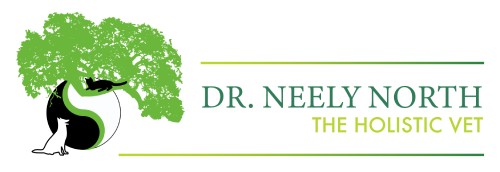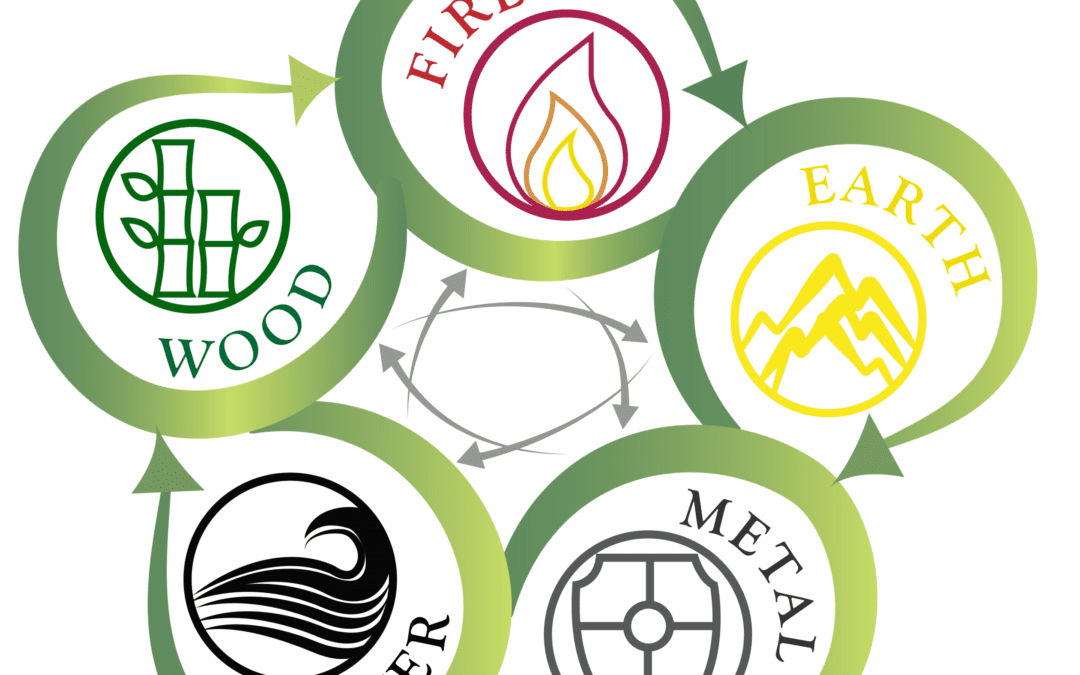TCVM (Traditional Chinese Veterinary Medicine) is a practice that involves the 5 Elements theory. Without getting into this too much, there is a way that each element is represented in the body of every being and keeping them in balance is health. When they are out of balance, there is disease. In traditional medicine, we tend to think in a linear pattern: if this is inflamed, let’s anti-inflame it (ex anti- inflammatory)… Or if this is infected with bacteria, anti-bacterial. These things are still important with the way I practice (integrative medicine). However, TCVM helps me take it a step further and find a way to address the root of disease. Once the body is back in balance, disease is less likely. Here is an example: Woody is a very protective shih tzu dog who feels it’s his job to keep the family and his yard safe. He has had 6 ear infections in the past year and has been more moody with other dogs – even trying to start fights he cannot finish. The regular vet did lab work recently and his liver enzymes are slightly elevated. These are all indications that the wood element is affected somehow. When I was a traditional vet the end of the road as far as helping pets like this is something like Hills Z/d diet, multiple ear medications and/or even chronic meds like Cytopoint or Apoquel. Now that I practice TCVM, I have been able to get many dogs off of these medications by helping their body obtain balance through acupuncture, food therapy, Chinese herbs. For this patient, we would identify the exact TCVM patterns causing the chronic issues and treat them. Over time, we would wean him from the cytopoint or apoquel.
Wood:
The elements work in a circle, everything is connected. If the circle has a starting place it’s the wood element. It represents youth, the beginning, a seedling, etc.
Season: Spring
Color: Green
Organs: Liver and Gallbladder ; Tendons and ligaments
Body type: athletic and strong
Imbalance emotion: Anger, frustration, irritation
Taste: Sour Foods that help balance: Green food, sour food ex. Collards, spiraling, wheatgrass
Ages/ season of life: Youth, prepubescent
Diseases associated: Gallbladder or liver disease, tendon / ligament injuries (think cruciate ligament injuries in an athletic animal or person)
Sound: Shout/ yell
Time of day : 11-1 am Gallbladder, 1-3 am Liver
Sensory organs: Eyes
Secretions: tears
Area of tongue: sides
Body Action: spasms/ tantrums
Fire
Next is the fire element. It represents teen to the beginning of childbearing years (so think early 20’s when we are the most emotional, energetic etc). A case example of an issue with this element is: a 4 year old red dachshund who is very vocal at home is having problems with separation anxiety. He pushes the owners hand to be petted, especially when she’s petting the other dog. His tongue is red, he’s thirsty and he’s always trying to lie on the tile floor or near an AC vent in the summer. At his last vet visit the vet heard a slight heart murmur.
Season: Summer
Color: Red
Organs: Heart and pericardium, small intestine, triple heater (think Body Type: thin or sinewy
Imbalance emotion: Fright, normal emotion is joy
Taste/ flavor: bitter
Foods that help balance:
Ages/ season of life: teen to mid/late 20’s
Diseases associated: Heart disease, small intestinal disease, Cushing’s disease, anxiety disorders
Sound: Laughter
Time of day: Heart 11 am to 1 pm; Small Intestine 1 pm to 3 pm;
Sensory organ: palate, tongue
Secretions: Sweat
Area of tongue: tip
Body Action: mania/ depression
Earth
I love the earth element. Is this because I am in the earth phase of my life? Or because it is the child of my constitutional element of fire? Or because the season is summer? Either way, this is the element of your typical slightly overweight, very sweet would never growl etc type of golden or Labrador retriever. A case example of an imbalance with this element is as follows: a 7 year old yellow lab presented for chronic intermittent vomiting and diarrhea. Occasionally there is even a loss of appetite when this happens. They have been feeding a low fat Rx diet but the issue is not completely resolved. In addition, now he’s starting to develop a lot of lipomas. This is an imbalance in the earth element – I would identify the patterns by looking at the tongue, ftelingthe pulses, asking lots of questions then we would treat the underlying pattern. Animals with these issues to great on human grade whole foods diets, Chinese herbs and acupuncture.
Season: late summer
Color: Yellow
Organs: stomach and spleen (includes pancreas)
Body Type: prone to being overweight Imbalance emotion: preoccupation/ worry Taste/flavor
Foods that help balance: rice, apricot, sweet potato, beef
Ages/ season of life: late 20’s to 30’s – when a lot of people have a family/ are raising children
Diseases associated: pancreatitis, stomach ulcers, stomach problems
Sound: singing
Time of day: 7 am to 11 am
Sensory organ : tongue
Secretions: Saliva
Area of tongue: center
Body Action : spitting/ vomiting
Metal
Metal humans are my favorite veterinary technicians. They are dependable, organized, do things the same way ever time and they are never late. Metal dogs and cats are some of my favorite patients. Once we establish some rapport and trust, they know this is what we do – she does acupuncture and I act like a good dog/ cat then we leave. And they do it every time. It’s great! An interesting fact is that the time of the lung – the organ associated with metal and grief is 3 to 5 am. I find it really common to wake up at this time when I’m grieving and it is the most intense at this hour. The other time associated with Metal element is 5 to 7 am – the Large Intestine time. I have a lot of patients with imbalances in this area who get their owners up to go outside for a bowel movement at 5 am. A case example of an imbalance with the metal element is a friendly but aloof gray cat who has chronic asthma that’s worse in the fall and a slightly flakey coat. Cats like this respond beautifully to TCVM treatment.
Season: Fall/ autumn (dry weather)
Color: white
Organs: Lung and Large Intestine
Body Type: normal, average
Imbalance emotion: Grief and sadness
Taste/flavor: pungent Foods that help balance: Rice, onion (humans only!), cinnamon, cumin, pepper
Ages/ season of life: Retirement age / empty nest
Diseases associated: Constipation, bronchitis/ asthma,
Sound: weeping
Time of day: 3 am to 7 am
Sensory organ: nose Secretions: nasal fluid (snot) – (I know I produce a lot of this when I’m grieving!)
Area of tongue: mid tip ( so the sides of the tip but not the actual sides – that is Liver/ Wood)
Body action: coughing/ wheezing
Water
The water element represents the last phase of life before death. Picture an older cat with kidney disease who can’t seem to get warm. Or a geriatric dog with a leaky bladder… The last phase of life is when we see problems in the water element show up. It can also happen earlier in life, especially if the patient is a water constitution.
Season: Winter
Color: white
Organs: kidney and bladder
Body Type: slight or even prematurely aging
Imbalance emotion: fear or terror
Taste/flavor: salty Foods that help balance: pork, peas, barley, kidney bean
Ages/ season of life: last season before death
Diseases associated: kidney disease, bladder disease, urinary incontinence, deafness
Sound: Groaning
Time of day: 3 pm to 7 pm
Sensory organ : ears Secretions: urine
Area of tongue: rear
Body action: Trembling/ shivering
Quiz
| WOOD | FIRE | EARTH | METAL | WATER | |||||
| Dominant/ alpha | Emotional / easily excited or feelings hurt | Slow moving, balanced or serene | Aloof | Timid or Fearful (Hides with strangers)/Trembles | |||||
| Friendly when balanced, can be aggressive/ dominant or territorial as well | Overly friendly, licking strangers, jumping on them etc. | Friendly but slow about it | Independent | Premature aging | |||||
| Prone to anger | Prone to anxiety; has separation anxiety | Prone to worry | Prone to lung issues like asthma or bronchitis | Bladder problems (especially in winter) | |||||
| Athletic and strong; often competitive | Sensitive | Pancreatitis or stomach problems | Dry skin | Arthritis | |||||
| Liver or gallbladder disease | Center of attention/ touch me! | Overweight | Sinus issues | Gets cold easily | |||||
| Tendon or ligament problems | Insomnia | Loves to eat | Cough | Hearing loss or deaf | |||||
| Ear infections | Heart disease or murmur | Vomiting | Constipation (cats especially) | Normal noises cause fear | |||||
| Fearless / pioneer spirit | Vocal – bark, whine a lot | Gum disease | Dislikes change/ upset with change | Kidney disease | |||||
| Eye problems or red eyes | Hyperactive if unbalanced / high energy in general | Diarrhea | Prone to depression or sadness | Craves or loves salty food (ex. cat who insists on dry food) | |||||
| Seizures | Very playful | Nurturing or motherly | Colitis | Weak in rear legs | |||||
| Patient | Impatient | Patient | Frequently gray/ silver coated, but not always | Unbalanced can go into total withdrawal | |||||
| TOTAL | TOTAL | TOTAL | TOTAL | TOTAL |

